Consumers are increasingly interested in non-meat-based protein options for reasons ranging from health and environmental concerns to animal welfare.
This change in consumer behaviour has led to increased production of alternative-protein sources. To reiterate, the protein transition is the shift of consumption and production from animal to vegetable and new protein sources.
According to the Food and Agricultural Organisation of the United Nations (FAO), global food production will need to increase by 56 per cent if the population reaches 9.7B by 2050.
Supply chains that rely less on animal protein need to be established to sustain the demand for food. As a result, the consumption of alternative proteins is expected to increase sevenfold between 2020 and 2035 to an estimated market value of €256B (97M tonnes).
We at Silicon Canals reached out to Martine Sourbag, Senior Trade Developer Agrifood, Amsterdam Trade & Innovate, to learn about the alternative protein startup ecosystem in Europe, the Netherlands, and Amsterdam. She also had interesting things to say about the trends and initiatives being undertaken by the City of Amsterdam to boost these startups.
Europe’s alternative protein sector
Throwing light on Europe’s alternative protein startup ecosystem, Sourbag says, “We see large-scale investments in the alternative protein sector. Globally, the alternative protein sector has attracted €2.8B in converted investments brought in by 2021.”
She adds, “Alternative protein-producing companies raised nearly €5.5B between 2010 and 2020. In Europe, investments are collectively more than €2B by 2021 in European companies engaged in non-animal proteins.”
Alternative protein startups in The Netherlands
According to Sourbag, the Netherlands is one of the front runners in Europe in terms of alternative protein market size, with a retail value of €100M in 2018, which is in line with Rabobank’s estimate.
She adds, “The meat substitutes segment is growing rapidly (15 per cent per year between 2015-2017) and is expected to grow to a market size of €140M by 2022.”
According to ProVeg’s study, the Dutch are Europe’s largest consumers of meat substitutes. Meaning an average Dutch person spends €17 per person per year on meat substitutes (~870g).
Sourbag says that more than 250 companies are active in the Dutch alternative protein sector, such as DSM, JBS (Vivera), Protix, and The Protein Brewery.
“In addition, many meats and dairy producers are leaping alternative proteins, such as Nutreco (Mosa Meat), Kennemervis Groep (Bobeldijk), Stegeman, Van Loon Group (Meatless Farm), and Vion (ME-AT),” she adds.
Sourbag also highlighted the increasing interest in the Netherlands from foreign investors such as Beyond Meat, ENOUGH, Meatless Farm, Oatly, Proeon, Redefine Meat, and Sophie’s BioNutrients, who have recently invested heavily in the Dutch market through research or production facilities. She also emphasised a couple of acquisitions — Vegetarian Butcher, acquired by Unilever, and JBS, acquired by Vivera.
Overall, Dutch organisations are well-positioned to support the global protein ecosystem and contribute to the protein transition with innovative and sustainable solutions.
Amsterdam’s alternative protein ecosystem
Talking about Amsterdam’s alternative protein ecosystem, Sourbag shares, “In Amsterdam, the market for alternative proteins, such as meat substitutes or dairy substitutes, is the largest of any city in the Netherlands. North Holland residents are also more often willing to replace meat with seaweed (28 per cent of residents in North Holland compared to 18% nationwide).”
According to Sourbag, the City of Amsterdam is taking various initiatives to boost alternative protein startups by enabling access to (international) markets, networks, capital, and talent.
Explaining the City of Amsterdam’s food strategy, Sourbag says, “The content of one’s plate belongs to the private sphere that the government should stay out of. But we can alert Amsterdammers to healthy plant-based alternatives to meat (plant-based instead of animal-based proteins). And influence the availability of those alternatives, making it easier for residents to choose plant-based food more often.”
She adds, “But more importantly, make Amsterdammers aware of what we eat, of the effects of our choices. For example, choosing vegetable proteins instead of animal proteins is not just a choice for different food but also more animal welfare, less CO2 emissions, and better health. The Amsterdam municipality wants to raise and stimulate this awareness.”
Amsterdam Trade & Innovate, which Sourbag is a part of, has partnered with Plant FWD to organise its first event on April 18th, 2023, in Amsterdam.
“The aim is to bring together startups, brands, investors, future talents, and other change-makers from around the globe to create a Plant Forward future together,” she adds.
Additionally, many local initiatives, like Amsterdam Impact, Amsterdam Smart City, Young Impactmakers, Starters4 Communities, Impact Hub, Circular@scale, AMS Institute, DutchBasecamp, and ACE, are focusing on making an impact through the startups that are helping.
Trends
With the recent popularity of plant-based and alternative proteins, many companies are trying to enter the market with new technologies and ingredients. While some are succeeding, others are still trying to find their footing.
According to Sourbag, technological developments in products are leading to a greater variety of alternatives to animal products and fish, the rising popularity of less processed and local food, and more focus on nutrients.
As Feike van der Leij, a health and food sustainability lecturer at Hogeschool Inholland in Amsterdam, describes, Protein Transition 2.0 is all about making the food chain more sustainable through better nutrition.
We have compiled a list of startups working on an alternative protein landscape from Amsterdam. We have sourced this list from Amsterdam StartupMap created in association with Dealroom. Check it out.
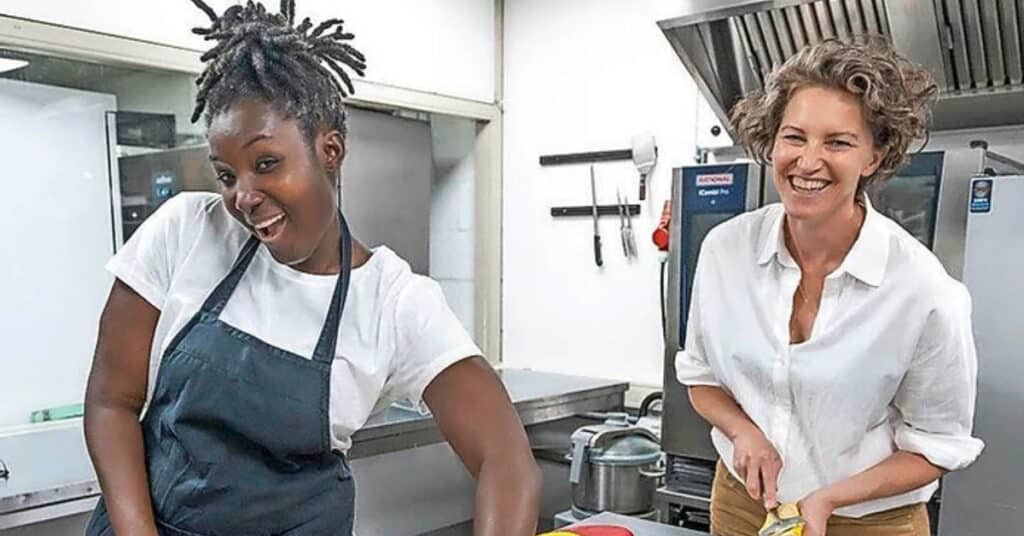
Max&Bien
Founder/s: Maxine Agyeman, Jobien Groen
Based out of Amsterdam, Max&Bien is known for its plant-based cheese products with natural flavours and great textures. The company aims to create the tastiest cheese and dairy alternatives by applying old techniques to nuts, oats, and rice. By offering plant-based alternatives, the Dutch startup is making it easier for people to choose the vegan option from time to time.
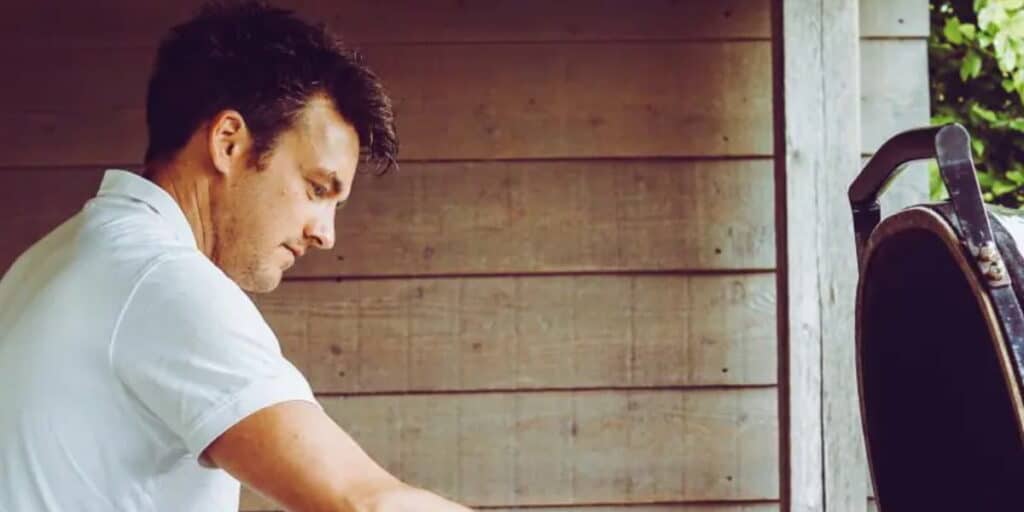
Lazy Vegan
Founder/s: Vincent Bosgraaf, Bas Dijkstra
Lazy Vegan is an Amsterdam-based brand that offers frozen ready-to-cook vegan meals. The company claims that the meals are made from 100 per cent natural and plant-based ingredients. Lazy Vegan adds that they are free from additives, gluten, and soy. The company aims to become the world’s most impactful vegan meal brand.
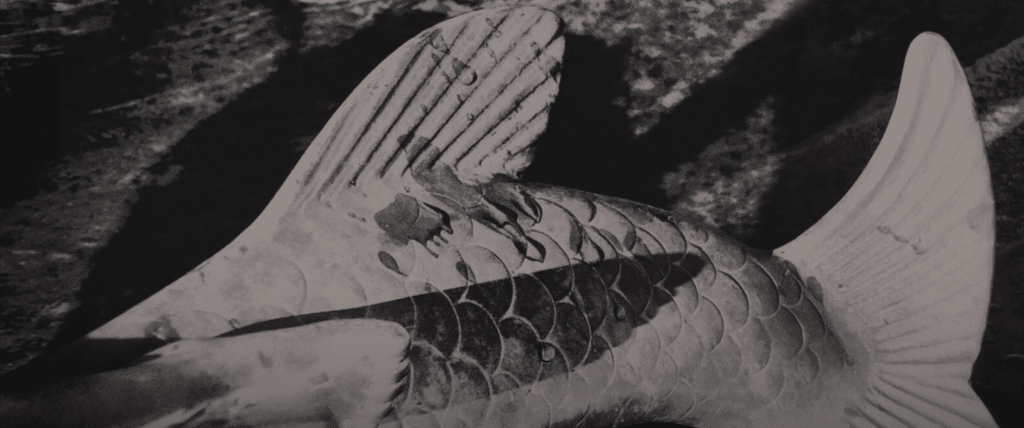
MagicCaviar
Lead: Dr. Arjan Palstra, Dr. Sundararaghavan Pattabiraman
Amsterdam-based MagicCaviar is developing the world’s first cell-based caviar and other oocyte cell-based novel foods. The company is on a mission to find an alternative source for the luxury seafood delicacy: caviar, pushing the Beluga sturgeon to the brink of extinction. The project ‘MagicCaviar’ is a partnership between scientists from Dutch startup Geneus Biotech and Wageningen University & Research (WUR) to create cell-cultivated caviar.
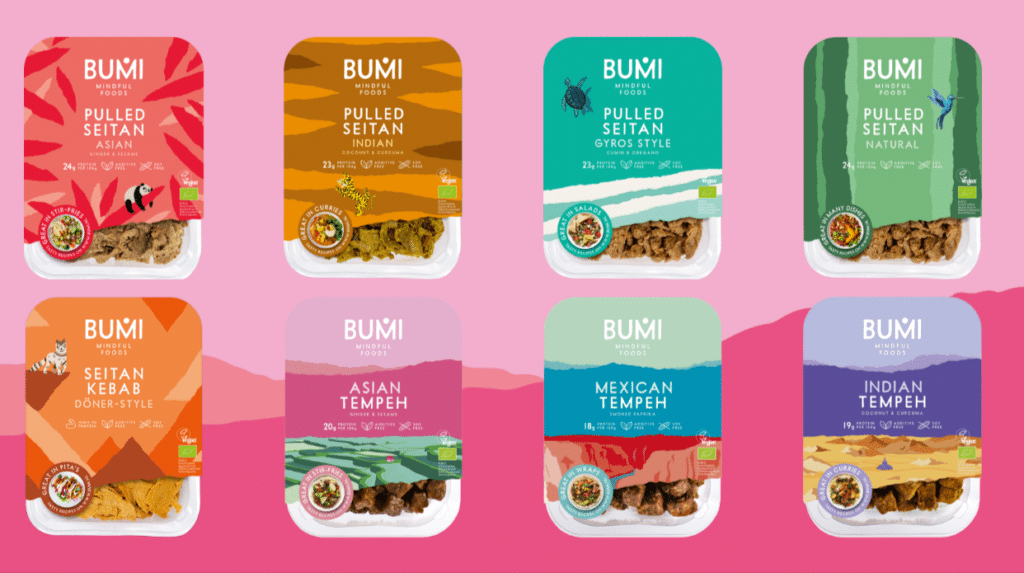
BUMI
Founder/s: NA
BUMI is a food and beverage company that produces tasty and nutritious plant-based food products such as lupin tempeh (fermented protein-rich pulse), pulled seitan (wheat-based delicacy rich in protein), and vegetable spreads. Currently, the startup’s retail and food service assortments are available in the Netherlands, Belgium, Germany, Switzerland, and France.
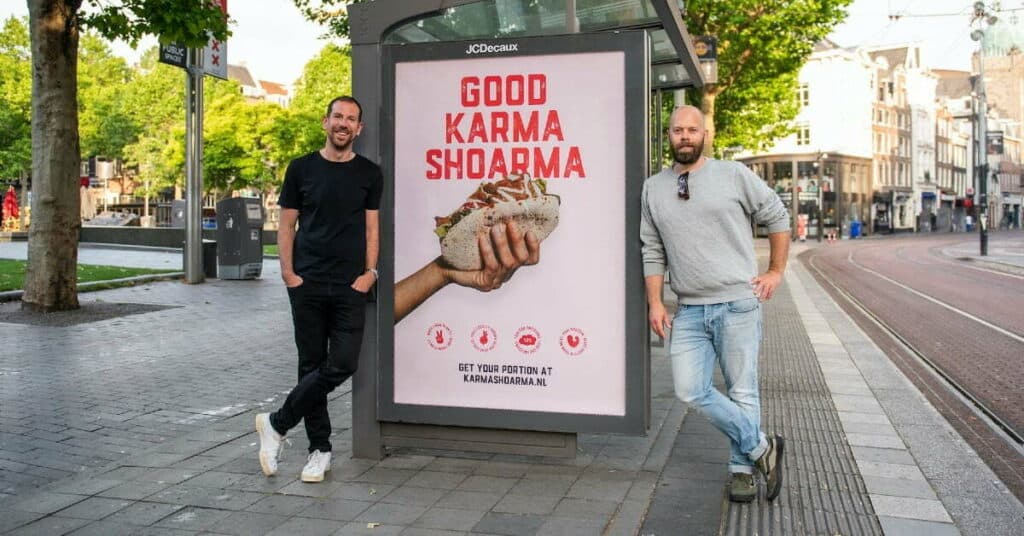
Karma Kebab
Founder/s: Marcel van der Heijden, Pascal Labrie, and Hidde Stolwijk
Karma Kebab makes vegetable kebabs from celeriac and grains grown in the Netherlands. The Amsterdam startup is a Certified B Corporation and aims to become the world’s largest and most sustainable kebab brand.
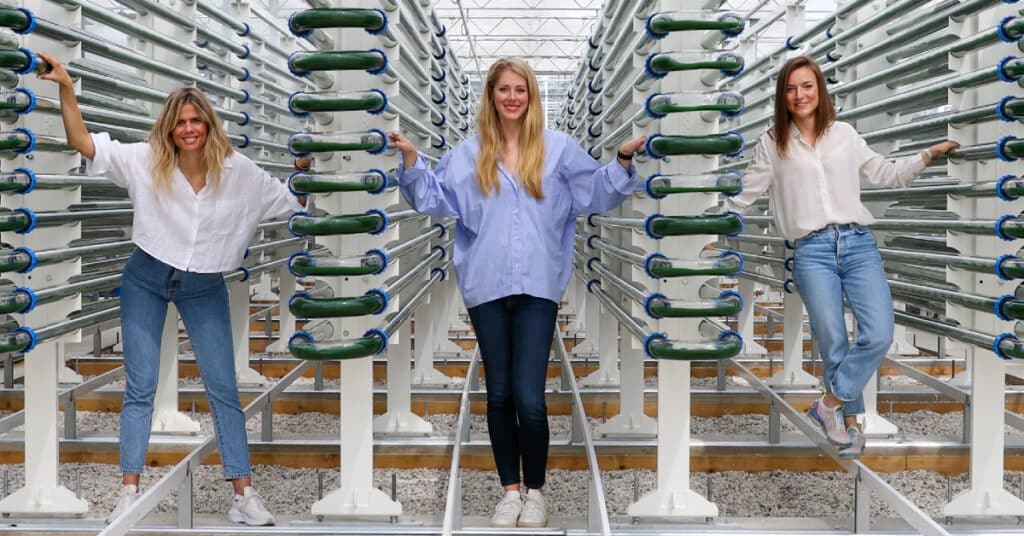
FUL Foods
Founder/s: Sara, Julia, Cristina
FUL Foods is an Amsterdam-based startup with a mission to produce food and beverage products that actively benefit our earth by removing carbon emissions, freeing up (arable) land, and utilising fewer resources.
The Dutch startup has developed a trademarked carbon-negative ingredient (“FUL”) made from microalgae that features essential protein and immune-boosting nutrients.
FUL Foods’ flagship product utilises technological advances in microalgae stability, bio assimilation, and digestibility, offering significant health benefits.
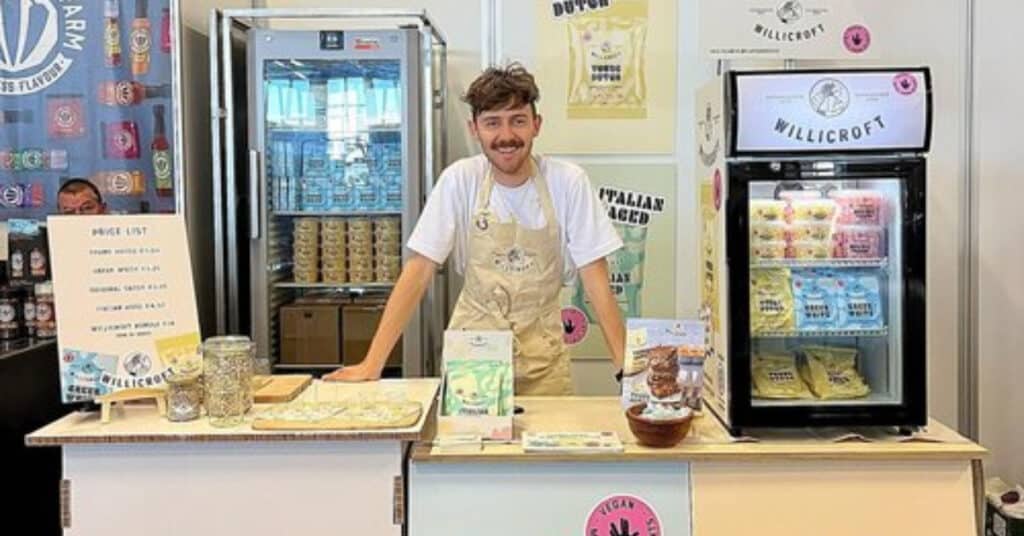
Willicroft
Founder/s: Brad Vanstone
Willicroft provides plant-based cheese for dairy cheese lovers. The company has created various plant-based cheese products and claims they taste real. In addition, the company aims to innovate to reduce its carbon footprint and help the dairy industry change more sustainably.
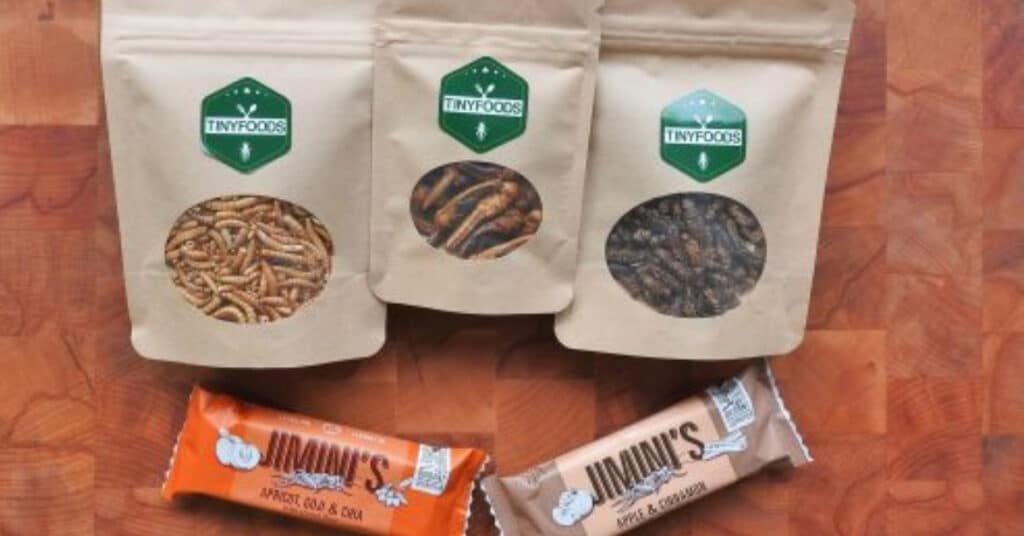
Tinyfoods
Founder/s: NA
Tinyfoods offers a diverse range of edible insects and insect-related products. The Amsterdam startup offers various products, including freeze-dried insects, protein and energy bars, candy, and snacks.

Seamore
Founder/s: Willem Sodderland
Seamore turns seaweed into everyday food. The Amsterdam company presents seaweed as a tasty, healthy, and sustainable alternative to pasta, bacon, wraps, and bread.
The company aims to bring them to market in Europe and other countries.
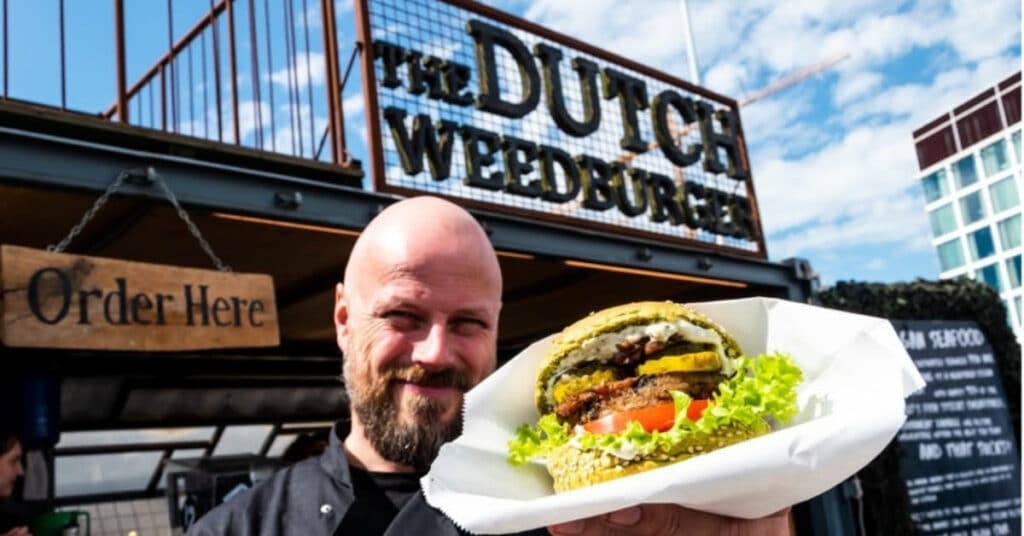
The Dutch Weed Burger
Founder/s: Lisette Kreischer and Mark Kulsdom
The Dutch Weed Burger is an Amsterdam-based online shop that offers a wide range of products, like weed burgers, weed balls, sea nuggets, and sea-wharma.
The food company is a spin-off from the founders’ eponymous documentary, in which they search for the best recipes to bring seaweed to the mainstream public. The company uses seaweed that grows in the Dutch Eastern Scheldt and is picked by hand on the sustainable seaweed farm of the company Zeewaar.
With governmental partners, Amsterdam Trade&Innovate has commissioned a report on the alternative protein shift in Noord-Holland. Click here to read the full report (in Dutch)










01
From telecom veteran to Dutch Startup Visa success: The Jignesh Dave story